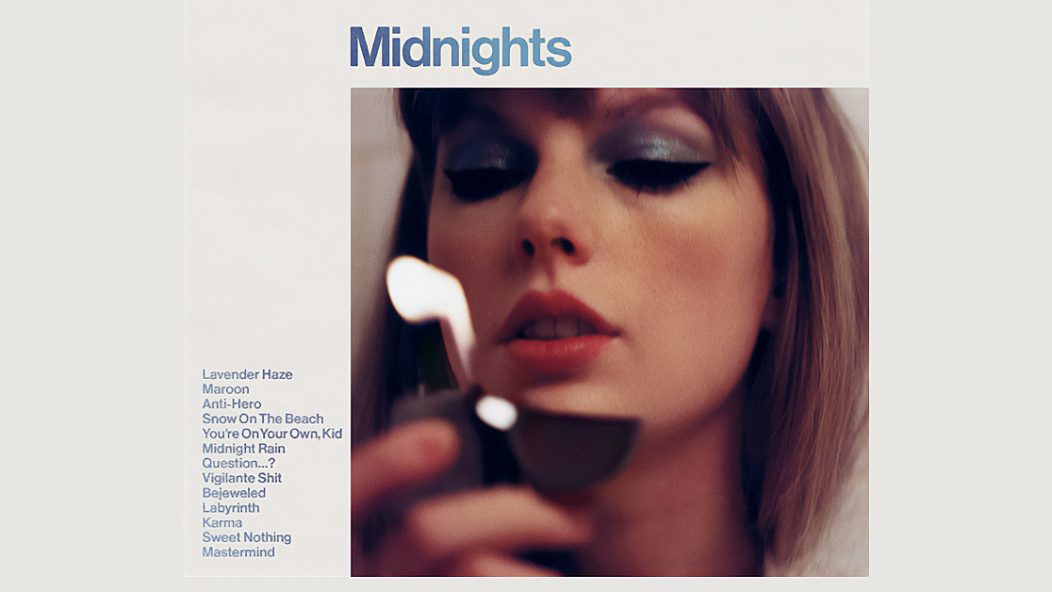
Review: Midnights is Taylor Swift’s darkest, most self-reflective work to date
Taylor Swift said it herself: She’s a mirrorball. And throughout the years, the versions of her have been seemingly endless: Met Gala Taylor, cottagecore Taylor, rebel Taylor, 2013 VMAs Taylor and so on. With her 10th studio album, Midnights, we’re meeting a new version of the pop star: the moody, confessional Taylor — the one with an old fashioned in hand staring at ceilings, ruminating and reconsidering the times in her life that have haunted her, where she was living in the moment without consequence. The mask is removed, the shiny things are gone — this is who Taylor is when the spotlight has switched off, or at least who she wants us to see for now.
While the retro visuals surrounding the Midnights era may have duped Swifties into believing the album was going to be her Carole King or Stevie Nicks era, Swift delivered one of her signature fake-outs (aside from a mention or two of incense and vinyl). Instead, the singer—with the help of go-to collaborator Jack Antonoff and a handful of co-writers including — William Bowery, Zoë Kravitz, Sam Dew — built on the bombastic bass-heavy synth-pop of Reputation and the horn-flanked ’80s flair of Lover, while sprinkling a handful of lush alt-folk moments that callback to folklore and evermore. The result is Swift’s most heart-in-throat work yet as she navigates intense highs and lows, flanked by a natural progression of meticulously crafted downtempo-pop production she’s been shaping since 1989.
Read more: 15 of Taylor Swift’s most emo songs ever, ranked
Swift, who voiced her struggle with having the “good girl” image attached to her for all of these years in the Miss Americana documentary, wrestles with the concept head-on in her music for the first time. Opener “Lavender Haze” is a seductive, minor-key track that channels Dev Hynes and strikes back at the societal expectations that haunt her like “The 1950s shit they want from me.” Instead, Swift would rather stay shrouded by the fog that protects the bliss of her private life with this song that seemingly calls back to the fever dream of “Cruel Summer.” On the R&B-tinged “Midnight Rain,” Swift details her version of the dissolution of a relationship over a syrupy, distorted Moog synthesizer. “He wanted a bride/I was making my own name,” she declares about the double standard she was beholden to by an ex.
On lead single “Anti-Hero,” Swift lays her insecurities bare — her depression, her scheming, the ever-expanding scope of her fame — as if she’s introducing herself to a support group. While riffing on the sweeping perception of who she is assumed to be, self-analysis wears on Swift’s sarcastic tone and transforms into reluctant self-acceptance. “I’ll stare directly at the sun but never in the mirror/It must be exhausting always rooting for the anti-hero,” she laments on the hazy pop track. Swift later zags into the ‘90s-alt-rock-tinged “You’re on Your Own, Kid” perhaps one of the “hundred thrown-out speeches” that finally saw daylight — a pep talk through a great betrayal, acknowledging the sacrifices she made along the way. “I gave my blood, sweat and tears for this/I hosted parties and starved my body/Like I’d be saved by a perfect kiss,” Swift proclaims.
Unsurprisingly, there is no shortage of stunning vignettes woven throughout Midnights. With hushed backing vocals from Lana Del Rey, the delicate lullaby (and maybe holiday song) “Snow on the Beach” evokes the romanticism of Eternal Sunshine of the Spotless Mind‘s wintry beach dreamworld as Swift meditates on a surreal connection. Swift also notably throws in a reference to Janet Jackson’s flirty 2001 hit “All For You” on the Blue Banisters-like cut: “Now I’m all for you like Janet/Can this be a real thing, can it?” On the heartwrenching “Maroon,” Swift reflects on one of the great romances of her life, echoing the intimacy of “Dress” (even with an allusion to a certain golden tattoo) and the restrained but colossal love affair depicted in “Dancing With Our Hands Tied.” “And I wake with your memory over me/That’s a real fuckin’ legacy, legacy,” she cries. That same legacy seems to be the subject of “Labyrinth,” one of the pop singer’s most deeply affecting songs in her discography, cementing the notion that Track 10s are the new Track 5s. On it, an apprehensive Swift combats the emotions of a new romance with mourning one of her great loves. “I’ll be getting over you my whole life,” Swift croons with her soft timbre.
If you can’t tell already, Midnights is rife with regret — the kind that can keep you staring at the ceiling for hours. “Question…?,” which samples “Out of The Woods,” features an emotionally tortured Swift left wondering what she could have done differently with a past love, sneaking in a hint of shade along the way (“And what’s that that I heard, that you’re still with her, that’s nice/I’m sure that’s what’s suitable/And right”).
There’s also nothing Swift likes better than revenge — at least in her music — so it makes sense that Midnights lets her fantasize away. The eerie, bass-heavy kiss-off “Vigilante Shit” is marked by the credo “Don’t get sad, get even” in what feels like an homage to Billie Eilish’s discography. Swift is a little less dark and twisty and a little more unbothered on “Karma,” a candy-coated anthem that has long been a part of Swiftian lore, with fans still speculating there could be a lost album with that title, too. On the surface, “Sweet Nothing” could be a jab at one of Swift’s public exes; but Swift loves a double meaning, and over sparse piano keys, she takes pleasure in the comfort and simplicity of things like “humming in the kitchen.” On sweeping closer “Mastermind,” Swift details her power moves as a plea for acceptance over anxious synths that recall the jittery opening of “Baba O’Riley.” “No one wanted to play with me as a little kid/So I’ve been scheming like a criminal ever since/To make them love me and make it seem effortless,” her voice cracks.
Compared to the singer’s earlier work, Midnights hits differently when it comes to her candor, owning parts of her story, dispelling assumptions and blocking out some of the noise along the way. Midnights is Swift at her finest, using her quill/fountain/gel pens to write some of her most vulnerable lyrics, screaming at the top of her lungs even through whispers. But that doesn’t mean Swift is ready to show her hand — and she doesn’t have to. With Midnights, the emotional stakes have never been higher as the pop mastermind meets herself — flaws and all — after dark.










